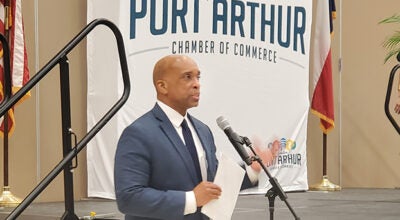Senate, House polish budget bills
Published 9:00 am Saturday, April 6, 2019
By Richard Lee
Special to The News
AUSTIN — The Senate Finance Committee unanimously approved a budget bill this week that matches the House’s appropriation on two of the session’s top priorities: education finance and property tax reform.
Both chambers settled on $9 billion in additional funding towards those goals, but exactly how that will be spent is still up for debate, State Sen. Jane Nelson, R-Flower Mound, said.
“We continue to negotiate this issue with the House, but both chambers have now reached $9 billion set aside for whatever agreement we reach,” the Finace Committee chairwoman said. The Senate budget would divide that money into three pools.
- $4 billion dollars would go to pay for the $5,000, across-the-board pay raises for public school teachers and librarians approved earlier in the session under Senate Bill 3.
- Another $2.3 billion would go to pay for other education finance reform measures.
- The remaining $2.7 billion would pay for property tax relief.
Nelson told members she intends to bring the measure, totaling $116.8 billion in discretionary state funding, before the full Senate for a vote next Tuesday.
On the floor Thursday, the Senate approved a bill that seeks to expand broadband internet access in rural Texas. Though the service has become widespread in urban and suburban areas since the turn of the century, the Federal Communications Commission estimates that at least 30 percent of rural Texans lack access to high speed internet.
Sen. Robert Nichols, R-Jacksonville, said he believes that’s costing small Texas communities tens of thousands of jobs and billions of dollars.
“A recent study by the U.S. Chamber of Commerce found that Texas could add as many as 23,000 rural jobs over the next three years and bring almost $4 billion of increased value if it bridges the digital gap,” he said. More than that, added Nichols, it can prevent access to services that are increasingly being offered on-line, such as telemedicine and virtual learning programs.
His bill, SB 14, would change that by allowing rural electric co-operatives to lay cable, fiber or other broadband infrastructure under existing easements. Many co-ops only have the legal authority to lay electric wire, so SB 14 proposes to change that by permitting them to use this private property access for broadband.
Property owners would be notified before any work and would have up to 60 days to opt out. Co-ops would have to keep a separate set of books for internet operations and couldn’t pass the cost of operating broadband onto customers in the form of electric rate hikes. That bill now heads to the House.
In committee action this week:
The Senate Business and Commerce Committee passed a bill Tuesday that would end surprise medical billing after committee chair and bill author Sen. Kelly Hancock, R-North Richland Hills, announced a compromise on the measure had been reached. As originally written, SB 1264 would’ve prohibited insurers from billing customers out-of-network rates for services provided at in-network facilities, and instead would use the existing mediation process at the state department of insurance to resolve the issue between the health care provider and the insurer. The patient protections remain, and are enhanced through the addition of imaging and lab work to the services protected, but the revised measure would replace the mediation process with an arbitration system modelled after the one used to settle contract disputes in Major League Baseball.
An independent arbitrator will consider the original amount billed, and the amount offered by the insurer as payment, and choose one or the other as the final settlement.
“[It] encourages both parties to offer reasonable and fair charges and payments from the beginning,” Hancock said. The bill no longer includes the opt-in provisions for self-funded insurance plans regulated at the federal level, though that portion could be considered in separate legislation.





